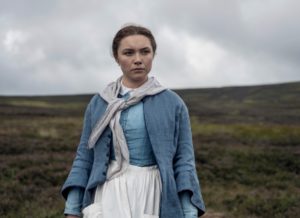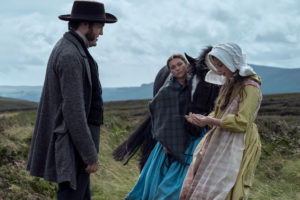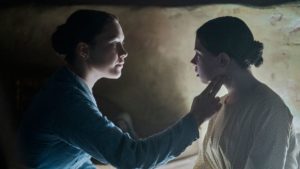The Wonder may fly under the radar, but it is still some of Florence Pugh’s best work
This review contains spoilers for the movie.
A smart consumer of media will watch anything for Florence Pugh; the 26-year-old Oscar-nominated actress is one of the most prolific in her field right now. Amidst the press mess that was Don’t Worry Darling–a psychological thriller/drama directed by Olivia Wilde that released earlier this year–Florence Pugh still came out shining. If Don’t Worry Darling was anything, it was an opportunity for Pugh to showcase her extraordinary acting skills and her overall grace.

The drama may have also, though, caused Pugh’s most recent movie to fly a bit under the radar. The Wonder, released on Netflix on November 16, received not nearly the same level of discussion that DWD did, although it certainly deserved much more.
Based on the novel of the same name by Emma Donoghue (also known for the critically acclaimed Room), The Wonder tells the story of Lib Wright (Pugh), an English nurse in 1862 sent to a small village in Ireland. Her task? Watching over eleven-year-old Anna O’Donnell (Kíla Lord Cassidy), who has become a local tourist attraction and pilgrimage destination for not having consumed any food in over four months. Anna claims she survives off of “manna from heaven,” and Lib, not nearly as religious as the O’Donnells and the townspeople, seeks to uncover the truth behind Anna’s prolonged fast.
The movie starts, interestingly, on a studio production set–the set for The Wonder. As the camera pans over the scaffolding, fake buildings, and lighting rigs, a voiceover of our unnamed narrator explains that the characters we are about to meet totally believe in their stories. “We are nothing without our stories,” she says. “And so we invite you to believe in this one.”
When we pan further to another set, zooming into a room of actors already in character and thus beginning our story, I frowned. Immediately, I felt out of the story, rather than in. The veil between fiction and reality had been torn before the fiction even started; how would I ever get into the narrative now?
My worries were short-lived. Within five minutes, I was captivated by the setting, the coloring, and Pugh’s acting. The score by Matthew Herbert is equally fascinating, a haunting wind-like whistling. Just as quickly as I had been thrown out of the story, I was in 1862 Ireland, journeying to meet the girl doing the impossible.
After many successive days closely observing–and growing closer to–Anna, Lib grows frustrated with being unable to figure out how she’s still alive. Between scenes of Lib at the O’Donnell’s, she is also in the inn she’s being housed at. Every night, she falls into a drug-induced sleep after taking out a set of crocheted baby shoes she has wrapped in a cloth along with a bottle of opium. We learn Lib lost both a husband and a baby at the same time we learn the O’Donnells lost Anna’s older brother. Grief, it seems, is a major theme in this film.

At the inn, Lib also grows close with Will Byrne (Tom Burke), a journalist sent to report on Anna. Lib is insistent that Will should not be allowed near the girl; in fact, she cuts off all direct human contact in an attempt to find out if Anna is really able to survive without food. Eventually he does meet her, bringing her a gift: a thaumatrope, an old toy that one spins between their fingers to make the images on either side appear as one. On one side, a bird; the other, a cage. Twisting the strings on each end reveals the bird as being in the cage. Anna asks Will if the bird is free or trapped, and he replies that this is for her to choose. Ah, I thought. A metaphor for her own entrapment.
***Spoilers begin here.***
As Anna grows ill, so do Lib’s suspicions that someone has been secretly feeding her. Will tells Lib she needs to stop this before the girl dies of starvation. When Lib at last uncovers the truth, it is not a fantastical, religious one; it is heavy with trauma, grief, and sadness, feelings Lib herself is intimately familiar with. Lib plots to fake Anna’s death and take her away from her family, saving her from her actual imminent death. She asks Will, who she has now developed a relationship with, for his help, though he thinks the plot insane; it isn’t until some scenes later that it can be determined whether he agreed to her plan.
Although at first, I felt that Lib and Will’s relationship had been rushed for the sake of a romance, I realized after finishing that this being true and this working for the story were not mutually exclusive. Lib had lost everyone in her life—it is very clear that she cannot sleep on her own, likely due to grief-related insomnia. The loss of her husband and baby left her alone, until she meets Will and Anna. When Lib asks Anna if she’d like to start a new life as a little girl who has never had anything bad happen to her, she’s asking herself as well. Lib, Will, and Anna have all gone through grief and loss and hurt; by being for each other the families they had lost, they start a new life together, wanting to heal.

The Wonder makes its viewers question aspects of their own morality, as well as question what freedom really means. When Will gives Anna the thaumatrope, he tells her she gets to choose if the bird is free or encaged. This is, of course, a representation of Anna being physically trapped in her situation, but it also works to represent grief. We get to decide if we let our grief encage us. When Lib chooses to save Anna, she also chooses not to let grief control her any longer. She smashes her bottle of opium, burns her baby’s shoes. She starts a new life.
For this same reason, we had been asked at the beginning of the movie to start the story from the outside, been shown the set, been asked to believe. Being in or out of the cage holds a larger meaning, one that applies to both the characters and the audience. Is the bird free, or is it trapped? That’s for you to decide.
Florence Pugh shines among an already stellar cast; her ability to really become the character she is portraying, the way she changes the way she speaks and acts as her relationships with other characters change, even the way she stands when she has no lines, all speak to her immense talent. With the shadow of Don’t Worry Darling still looming, I hope she gets the recognition she deserves for this role. It’s no coincidence this was released during Oscars season. The Wonder is one of Netflix’s stand-outs this year; a beautifully-shot, haunting story that will remain with its viewers for a long time, asking them to believe.
The Wonder is available to stream on Netflix.

